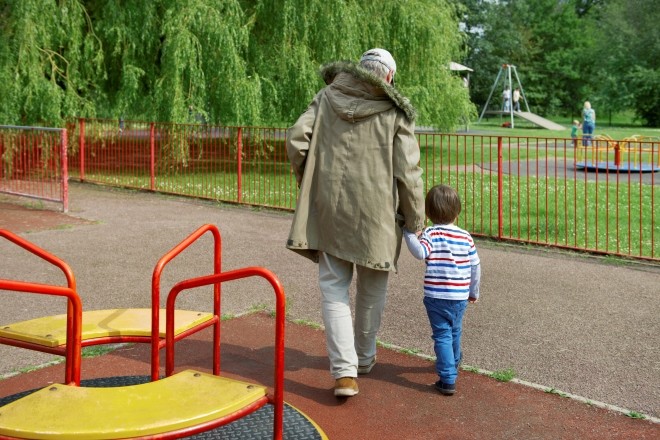The public regularly conduct experiments: check how the child reacts to a meeting with an absolutely unfamiliar person who is calling him somewhere. The statistics turn out horrifying: from several tens participants of experience only one call for help. The rest obediently take the "uncle" by the hand and follow. And after all, without exception, parents are sure that their children will remain in place. More than that, most children do not know the parents' phones by heart. They do not know that in case of danger it is necessary to attract attention to themselves by any available information. Another terrible statistical fact is that the peak of the loss of children falls on the spring. A photo: GettyImagesUnder the country is not the first year the search and rescue team "Lisa Alert" is working. The volunteers of the detachment are just looking for the missing people - all, not just children. There is a group of prevention in the detachment. Volunteers conduct free classes for children and parents: they teach both of them how to behave with strangers correctly, what to do if a person offers "to go look at the kittens". Yes, you will not believe, but children are bought for such offers. The volunteers of the prevention group of the search and rescue team "Lisa Alert" told about the important rules of behavior that can save a life. Alina Pavlyukova, the head of the line of prevention of the PCA "Lisa Alert": "
A photo: GettyImagesUnder the country is not the first year the search and rescue team "Lisa Alert" is working. The volunteers of the detachment are just looking for the missing people - all, not just children. There is a group of prevention in the detachment. Volunteers conduct free classes for children and parents: they teach both of them how to behave with strangers correctly, what to do if a person offers "to go look at the kittens". Yes, you will not believe, but children are bought for such offers. The volunteers of the prevention group of the search and rescue team "Lisa Alert" told about the important rules of behavior that can save a life. Alina Pavlyukova, the head of the line of prevention of the PCA "Lisa Alert": " 1.Teach your child to say "no" to strangers. Let him say, "Sorry, but my mother doesn't allow me to talk to strangers." 2. Explain that adults don't ask a child for help. If something really happened to them, they will ask an adult. 3. Teach your child to scream! Oddly enough, children are afraid to do this. A child should scream if he gets lost, including in the city, and if someone tries to grab him or is aggressive. Arrange a training session for this in the forest and then be sure to try it in the city. 4. Explain to your child that it is impossible to distinguish a "good" person from a "bad" one by appearance. Therefore, even a young girl can be bad. 5. Explain to your child that if someone tries to force him to do something, threatening him with anything, including killing his parents, he should immediately tell you about it.
1.Teach your child to say "no" to strangers. Let him say, "Sorry, but my mother doesn't allow me to talk to strangers." 2. Explain that adults don't ask a child for help. If something really happened to them, they will ask an adult. 3. Teach your child to scream! Oddly enough, children are afraid to do this. A child should scream if he gets lost, including in the city, and if someone tries to grab him or is aggressive. Arrange a training session for this in the forest and then be sure to try it in the city. 4. Explain to your child that it is impossible to distinguish a "good" person from a "bad" one by appearance. Therefore, even a young girl can be bad. 5. Explain to your child that if someone tries to force him to do something, threatening him with anything, including killing his parents, he should immediately tell you about it. 6. Explain to the child that if someone else meets him after school or a circle, and you did not warn him, he must call you and clarify. He also has to do so if someone from his close relatives wants to give him a lift. Unfortunately, friends and relatives sometimes seriously quarrel and can use even the child as a means of resolving the conflict. The phone number of the child (and elderly parents) must be registered with you. The cellular operator issues printouts of his calls only to the person with whom the phone is registered.8. Use modern gadgets and programs and to protect your children and elderly relatives. In smartphones you can install programs - GPS locators of your family members. Take pictures of the child more often. If you have an actual photo, in which the child in the clothes in which you saw him before disappearing, this will facilitate the search.
6. Explain to the child that if someone else meets him after school or a circle, and you did not warn him, he must call you and clarify. He also has to do so if someone from his close relatives wants to give him a lift. Unfortunately, friends and relatives sometimes seriously quarrel and can use even the child as a means of resolving the conflict. The phone number of the child (and elderly parents) must be registered with you. The cellular operator issues printouts of his calls only to the person with whom the phone is registered.8. Use modern gadgets and programs and to protect your children and elderly relatives. In smartphones you can install programs - GPS locators of your family members. Take pictures of the child more often. If you have an actual photo, in which the child in the clothes in which you saw him before disappearing, this will facilitate the search. Photo: GettyImages
Photo: GettyImages 10.Make it a habit to call each other when you leave and when you return. Adults should show this by example. For example, call each other in the evening when you leave work. This useful habit can sometimes save lives. 11. Do not forbid your child to create his own page on a social network if he asks for it, so that he does not create a secret account. On the contrary, sit down together, make a page together, surf the net. Teach your child the rules of safety on the Internet: do not post your photos and contacts in the public domain, do not respond to "attractive" offers from strangers, remember that he never knows who a stranger really is. Explain what dangers exist. From time to time, look through the list of your child's "friends", pay attention to adults, if they are not teachers, see what groups he reads and what publics he is subscribed to. On the Internet, a child will be bombarded with a lot of attractively presented information about drugs, suicide and other things. And yes, "whale groups" really exist and really pose a threat to a child. Explain to your child the pointlessness of participating in this and that there are adults behind it who are looking for controlled children for their own purposes. We often see in movies that the police are in no hurry to start searching for missing persons until three days have passed. Well, the "three-day rule" does not exist. Immediately call 112 or go to the nearest police department. If the department suddenly refuses to take a statement, dial 112 and inform the operator about it, indicating the department number. Liza Alert's 24-hour phone number: 8-800-700-54-52.
10.Make it a habit to call each other when you leave and when you return. Adults should show this by example. For example, call each other in the evening when you leave work. This useful habit can sometimes save lives. 11. Do not forbid your child to create his own page on a social network if he asks for it, so that he does not create a secret account. On the contrary, sit down together, make a page together, surf the net. Teach your child the rules of safety on the Internet: do not post your photos and contacts in the public domain, do not respond to "attractive" offers from strangers, remember that he never knows who a stranger really is. Explain what dangers exist. From time to time, look through the list of your child's "friends", pay attention to adults, if they are not teachers, see what groups he reads and what publics he is subscribed to. On the Internet, a child will be bombarded with a lot of attractively presented information about drugs, suicide and other things. And yes, "whale groups" really exist and really pose a threat to a child. Explain to your child the pointlessness of participating in this and that there are adults behind it who are looking for controlled children for their own purposes. We often see in movies that the police are in no hurry to start searching for missing persons until three days have passed. Well, the "three-day rule" does not exist. Immediately call 112 or go to the nearest police department. If the department suddenly refuses to take a statement, dial 112 and inform the operator about it, indicating the department number. Liza Alert's 24-hour phone number: 8-800-700-54-52.

Making Money with Desserts: Success Stories
Evgeniya Polischuk (Fedutinova) instagram:@evgeniyafedutinovavk.com/janeshomebaking– It all started with baking for family and friends. Gradually, I started posting photos of my baked goods on Instagram – and orders started coming in. I made my first custom-made cake on October 13, 2014, and a little earlier I started making macaroons and cupcakes. You could say that the business “found me”, I am very […]

Soups are cold recipes with photos
Cold cucumber soup with yogurt and lemonsorbet from the chef of the restaurant La Taverna Alexander Zhurkin Photo: Getty Images Ingredients: Plain yoghurt – 125 g Cucumber – 150 g Lemon/lime sorbet – 50 g Cocktail shrimp – 24 g Fresh ginger juice – 1 g Lime juice – 5 g Fresh orange juice – 5 g Parsley – 1 g Pink pepper – 1 g Watercress – […]

barbeque kebab
Pork tenderloin in glaze Photo:Dmitry Bayrak/dbstudioPreparation time: 20 minutes + marinating time.Calories: 454 kcal per serving.For 4 servings: 4 pork tenderloins (approximately 300 g each), 1 onion, 2 cloves of garlic, 1 tsp. lemon zest, 1 tsp. lemon juice, a pinch of ground cumin, coriander and turmeric, 1 tbsp. vegetable […]

Pierre Duacan: dietary recipes: Ducane diet
Beetroot soup Photo:Season’S, Luxury Hotels RepresentationYou will need:· Boiled beetroot – 60 g· Fresh cucumbers – 20 g· Red radish – 20 g· Green onions – 10 g· Egg – 1 pc.· Drinking mineral water – 200 g· Salt – 1 gPreparation:· Boil the egg and beetroot.· Grate the cucumbers, radish and part of the beetroot. Put everything […]





